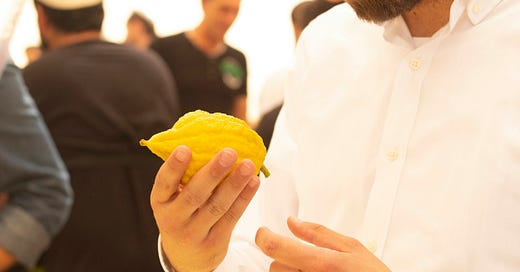Sukkot is called Zman Simchatenu, “the time of our joy.” But joy, especially Autistic Joy, doesn’t always look the way that society and neuronormative folks expect from us. For autistic people, joy isn’t about big displays or performing happiness according to what’s “acceptable” or “normative”. Joy for us is about unbridled expression. It’s physical. It’s tangible. It doesn’t “look like” joy that we see portrayed by most.
Autistic Joy is raw, and often it’s found in the things that comfort us—small details, sensory experiences, things others might overlook. It’s like the sukkah itself: temporary, fragile, but full of meaning when we embrace it. When we unmask and let ourselves feel the things that bring us joy, we connect to something deep and real.
The sukkah is temporary, much like the spaces where many of us feel safe to unmask. But even in its fragility, it holds strength and meaning—just like our joy. Sukkot reminds us that even temporary moments of joy and safety are worth celebrating.
It’s something I feel in the quiet moments of Sukkot — sitting in the sukkah, shaking the lulav, feeling the wind move through the branches, the rain coming thru the roof. It grounds me to the Earth, to myself, to the natural cycle of life and of time.
Rabbi Mordecai Kaplan taught that happiness is essential to spiritual life, and Sukkot gives us a chance to lean into that. For autistic folks, joy can be a way to resist a world that often tells us to mask or hide what makes us happy. Sukkot invites us to find joy in the essentials—the safety of a sukkah, the presence of those who really get us, the sensory richness of this season.
Joy need not be loud, though it certainly can be. It can be stimming under the sukkah or feeling grounded in the structure we built. Just like the lulav and etrog, our different pieces of joy all matter—they make up the whole experience.
As we enter this Sukkot, let’s lean into that joy, in whatever form it takes. Whether it’s quiet or exuberant, personal or shared, let’s let it be fully ours. And in doing so, we’ll fulfill the mitzvah of simcha—real, authentic joy.
Mati is a disabled autistic rabbinical student, autism educator & spiritual director based in Paris. Learn more here.



